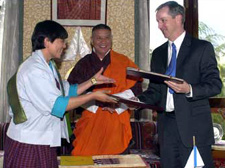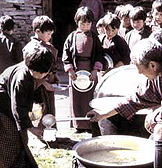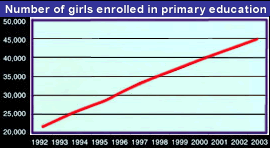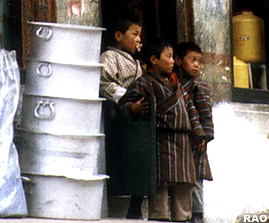 |
Bhutan Development |
|
 |
Bhutan Information |
|
|
 |
| World
Food Programme in Bhutan |
 |
|
WFP
continues to hold strong |
 |
 |
| Foreign minister Lyonpo Khandu Wangchuk, foreign secretary Aum Neten Zangmo
and regional director of WFP Asia Mr Anthony Banbury |
| WFP,
created by the United Nations in 1963 to provide food assistance for the
needy, opened its country office in Bhutan in 1976 on the invitation of
the government. Some 27 years down today WFP still holds strong and most
educated Bhutanese have been WFP beneficiaries at one time or the other. |
|
Karma
Dorji was about eight years old when he was enrolled as a boarding student
in a primary school in Tsirang in 1982. He did not feel good about leaving
home.
Next
day a big truck rolled in at the school campus loaded with fat nylon sacks,
fish-smelling boxes and white five-litre Jerry cans. His senior schoolmates
unloaded the truck and carried the sacks and boxes and cans to a dank,
rat-infested storeroom adjacent to the school kitchen.
That
evening, Karma, for the first time, had a meal he had never tried before.
A strange sumptuous meal of pure wheat and deep-fried flat salted dry fish.
He liked the fish so much that he bribed an older friend who was in charge
of the store and took home, during his summer break, a few pieces of the
dried fish for his parents. The meals that Karma ate was part of the school
feeding programme started in several schools in the country decades ago
by the world food programme (WFP).
Meanwhile,
Karma Dorji today is a government servant. But he frankly says that he
often misses the fried "bulgar" breakfast that never let him go hungry
"for an unbelievable long time".He remembers a particular breakfast. One
of his friends had accidentally bitten a rat's tail mistaking it for a
chili. The rat had burrowed into the fat nylon sack and was later cooked
with the wheat.
 |
| In 2003, WFP provided school feeding assistance to 33, 284 students |
| Besides
feeding school children, WFP continues to support construction of roads
and suspension bridges, health, agricultural re-settlement, forestry, irrigation
and dairy development. "WFP has always closely worked with the government
in line with its most important priorities," said the WFP-Bhutan representative,
Mr Gerald Daly. "For example, it is at present channeling 80 percent of
its resources to the education sector in support of the goal of universal
primary education for all by 2007." |
|
In
2003, the education ministry with WFP's support, provided school feeding
assistance to 33,284 students of which 43 percent were girls.
top
|
WFP's
support increased students' enrolment |
 |
 |
| WFP's
support has increased students' enrolment, attendance rate and reduced
dropouts. It has also reduced the financial burden on parents while sending
their children to schools, and provided students with proper boarding.
In 2003, WFP provided 162 and 195 boys, some of whom formally lived in
huts around the school, with boarding hostels. |
|
WFP
also mobilised resources worth US $ 99,551 from the oil and petroleum exporting
countries (OPEC) nations to construct two hostels in Nobding, Wangduephodrang,
and Kamji, Chukha the construction of toilets at the national institute
for the disabled in Khaling, Trashigang. From a food basket of wheat, dry
fish and vegetable oil in 1980s today WFP's food aid basket consists of
rice, pulses, canned fish, vegetable oil, maize meal, sugar and corn Soya
blend, popularly known as 'nutrela'. In collaboration with the department
of roads of the ministry of works and human settlement, WFP has also been
providing food aid to the national work force.
Last
year, 2,354 road workers and 9,416 of their family members received food
assistance. The programme also constructed 19 dwelling quarters for the
road workers with safe drinking water located at three kilometres from
schools, and established two pilot day-care centres. About 70 workers have
received non-formal education and vocational skills training and 323 workers'
family members were provided with access to general health services.In
2004 a 'safety fund' of US $ 313,402 will be used to improve workers' housing,
health services, basic training and children facilities.
 |
In
January 2003, WFP launched a 'food for work programme' with the
agriculture ministry in six 'most vulnerable eastern districts' which has
improved access to health, education and agricultural services for several
hundred families. This programme, however, will be taken care by the government
alone starting June, 2004, and the left over WFP resources will be channeled
to support a new activity, according to the WFP 2003 report.
The
WFP also works closely with the food corporation of Bhutan to facilitate
safe transportation of food to remote schools and construction work sites
states the report. |
|
WFP funded the construction of a food warehouse in Samdrup
Jongkhar and procured about 48 percent of its commodities locally in 2003.
Mr
Gerald Daly, said that WFP is trying to broaden its activities in Bhutan.
"We have particularly outlined some future support to education," he said.
"These are, a pilot effort to revitalise school agricultural projects,
providing fuel-efficient stoves to 23 schools and upgrade school kitchen,
food storage and dining facilities in 97 schools." It has already secured
US $ 32,110 from the Japanese friendship association for 42 fuel-efficient
stoves.
 |
| Contributed by
Gopilal Acharya, Kuensel, Bhutan's National Newspaper |
top
| Links |
 |
 |
 |
External
links |
|






